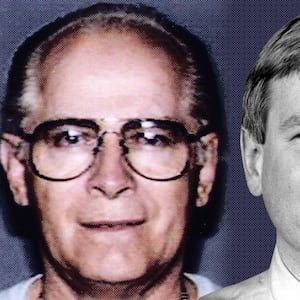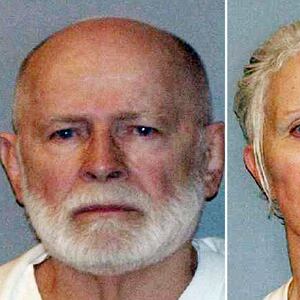James “Whitey” Bulger was killed Tuesday in a West Virginia prison, multiple outlets reported, ending the life of Boston’s most notorious mobster.
“At approximately 8:20 a.m., inmate James Bulger was found unresponsive at the United States Penitentiary (USP) Hazelton, in Bruceton Mills, West Virginia,” the Federal Bureau of Prisons said in a statement.
“Life-saving measures were initiated immediately by responding staff. Mr. Bulger was subsequently pronounced dead by the Preston County Medical Examiner.”
ADVERTISEMENT
No staff members or other inmates were injured, the statement added.
The 89-year-old Bulger, who was serving a life sentence for the murder of 11 people, arrived at the the high-security U.S. Penitentiary Hazelton in Bruceton Mills on Monday night, after he was transferred from a prison in Florida.
Authorities are reportedly investigating a fellow inmate with ties to the mafia, three people briefed on the situation told The Boston Globe. The New York Times reported that Bulger was “beaten to death” by at least two inmates who are thought to have an affiliation with the mob. A senior law enforcement official told the Times they had heard “an organized crime figure was believed to be responsible” for Bulger’s killing.
The Globe reported later Tuesday that 51-year-old inmate Fotios “Freddy” Geas suspected in taking part of Bulger’s murder. The newspaper reported that Geas was known for hating “rats” and men who were abusive to women. He also was known for his “violent impulsivity” as a former Mafia hitman.
Bulger’s brother John told the Globe that the family had not been notified of his death.
Bulger was reportedly moved for health reasons—he’s had heart problems for over a decade, The Boston Globe noted—but Hazelton is not a medical facility.
Since his conviction, Bulger repeatedly moved between prisons. He was originally incarcerated in Arizona, but was transferred to Florida’s U.S. Penitentiary Coleman II in Sumterville in 2014 after his relationship with a female psychologist was called into question. After he recently left Florida’s prison, he briefly stopped in Oklahoma City en route to West Virginia.
Before his capture in 2011, Bulger was one of America’s most wanted gangster criminals. Raised in a South Boston housing project, he was first arrested at the age of 13 for delinquency, according to a New York Times timeline of Bulger’s past. He quickly earned the nickname “Whitey” due to his white-blonde hair—a moniker he reportedly despised. He allegedly preferred the name “Boots,” a reference to his cowboy boots and the switchblade he often stashed inside.
Between 1948 and 1952, he served in the U.S. Air Force, and was honorably discharged. But in 1956, he was arrested for robbing banks in Massachusetts, Indiana, and Rhode Island. He was sentenced to 20 years but served just nine.
While in prison in Atlanta, Bulger enrolled in the CIA’s controversial MKUltra project, where he received LSD in exchange for a slightly reduced sentence. He later learned that the program was part of the CIA’s effort to engage in mind control, which infuriated him.
MKUltra, he said, deeply traumatized him. “It’s 3 a.m. and years later I’m still effected [sic] by LSD in that I fear sleep,” Bulger wrote in personal papers later seized by the FBI and cited by the Globe. “The horrible nightmares that I fight to escape by waking. The taste of adrenaline, gasping for breath often I’m woken by a scream and find it’s me screaming.”
After two escape attempts, Bulger was sent to Alcatraz for three years.
When he left prison, Bulger joined Boston’s Winter Hill Gang. He eventually linked up with Stephen J. Flemmi, and the pair began their own criminal activity. By the mid '70s, he became an informant for the FBI—a claim Bulger vehemently denied—allegedly reporting on rival mobs.
During those years, Bulger and Flemmi reportedly killed multiple people to defend their criminal efforts. Their victims allegedly included Albert “Bud” Plummer, a rival gang member who was gunned down by a machine gun while driving down a commercial Boston street in 1973; and William O’Brien, Bulger’s one-time accomplice who was murdered four days before his son was born.
Bulger reportedly often took naps immediately after shooting his victims, according to his obituary in the Boston Globe.
In 1994, Bulger went on the run after a retired FBI agent—for whom he worked as an informant—warned him of a forthcoming indictment.
Bulger was eventually indicted on murder charges in 2000, but spent more than 16 years on the run. He made the FBI’s most-wanted list, and drew the largest-ever reward for capture—$2 million—for anyone on the FBI’s list of top-10 domestic fugitives.
In 2006, one tipster reported him attending a screening of Martin Scorsese’s Boston mob movie The Departed—for which he inspired the mob boss character played by Jack Nicholson—in San Diego, California.
The tipster may have been right. On June 23, 2011, he was arrested without incident at a private home in Santa Monica, California. He was indicted on 32 counts, including 19 murders.
On August 12, 2013, a federal jury convicted Bulger of committing 11 of those murders, as well as racketeering, extortion, money laundering, obstruction of justice, and narcotics distribution after five days of deliberation. Bulger called his trial a “sham.”
That November, Bulger was sentenced to two life terms plus five years. Before announcing the sentence, U.S. District Judge Denise Casper told Bulger that the “scope, callousness and depravity of your crimes are almost unfathomable.” Bulger reportedly refused to look at any of his victims during the sentencing hearing.
“You have, over time, become the face of this city,” Casper added. “That is regrettable.”
—Julia Arciga contributed reporting.







